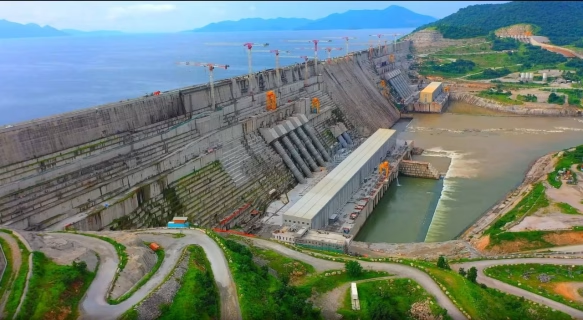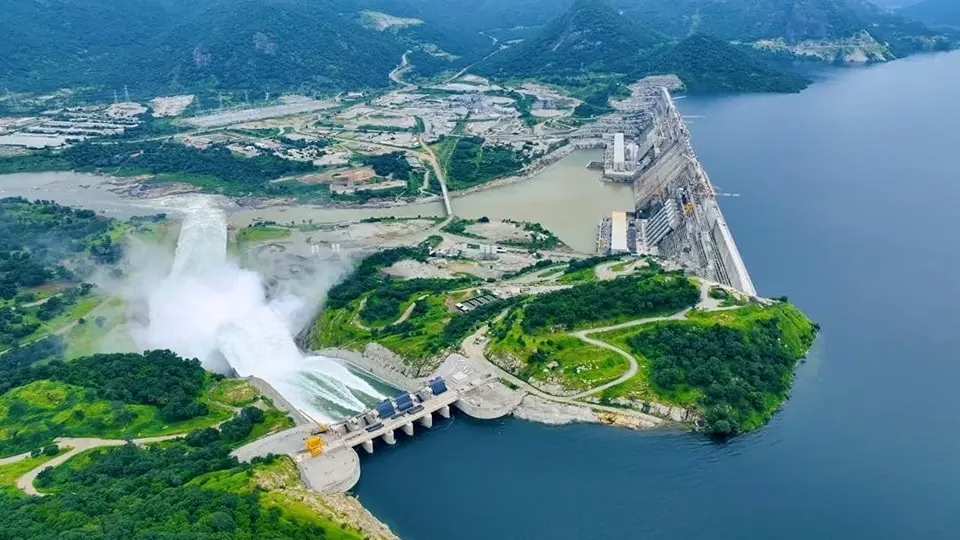Updated 10th September 2025- Ethiopia’s Prime Minister Abiy Ahmed has noted that the construction of the Grand Ethiopian Renaissance dam is complete. Considered Africa’s largest hydroelectric dam, the multi-billion-dollar mega-dam has now been inaugurated. The prime minister noted that the dam will be officially inaugurated in September which has come to pass. The long-awaited dam was launched in 2011 with a $4 billion budget. The dam stretches 1.8 kilometers wide and 145 meters high. Addis Ababa says it is vital for its electrification programme but it has been a source of tensions with downstream nations. Nations such as Egypt and Sudan are concerned that it will affect their water supply.
Speaking in parliament, Abiy said that GERD was complete and they were preparing for its official inauguration. Additionally, he called out neighbors downstream, Egypt and Sudan stating that the Renaissance Dam is not a threat, but a shared opportunity. Furthermore, he noted that the energy and development it will generate stand to uplift not only Ethiopia.
After overcoming numerous obstacles, the Renaissance Dam was officially opened in the presence of Prime Minister Abiy Ahmed. The foundation stone was set for the project 14 years ago.
The Grand Ethiopian Renaissance Dam, which has long been a source of frustration for Ethiopians, now stands complete and celebrated with an inauguration ceremony in Guba.
Also, during the inauguration, Prime Minister Abiy Ahmed announced a new wave of mega-projects, including the construction of a mega nuclear power plant.
The extensive development plan boasts a combined value of over $30 billion. The upcoming development marks a bold shift towards industrialization and self-reliance for the East African nation.
Also read:
Africa’s Largest Hydroelectric Project: The Grand Ethiopian Renaissance Dam Nears Completion
The Significance of Africa’s Largest Grand Ethiopian Renaissance Dam
Ethiopia’s Grand Ethiopian Renaissance Dam is of major significance to not only Ethiopia but to Africa as a continent. Ethiopia first began generating electricity at the project, located in the northwest of the country around 30 km from the border with Sudan, in February 2022. At full capacity the huge dam can hold as much as 74 billion cubic meters of water. Moreover, it will generate more than 5,000 megawatts of power, more than double Ethiopia’s current output. The East African country is the second most populous on the continent. Its rapidly growing population is currently estimated at 130 million and has growing electricity needs.

Around half the population lives without electricity, according to estimates earlier this year by the World Bank. Despite its significance, the dam has often faced opposition from other nations. Egypt and Sudan have voiced concerns about GERD’s operation without a three-way agreement. They fear that it could threaten their access to vital Nile waters. Negotiations have often failed to make a breakthrough. Egypt, which is already suffering from severe water scarcity, sees the dam as an existential threat because it relies on the Nile for 97 percent of its water needs. However, Abiy said Addis Ababa is “willing to engage constructively”, adding that the project will “not come at the expense” of either Egypt or Sudan.
Other Mega Hydropower Projects in Africa
The Grand Ethiopian Renaissance Dam will be joined by Cahora Bassa Hydropower Project in Mozambique and Batoka Hydropower Project in unlocking Africa’s hydropower potential. These Hydropower projects will boost the African economy by supplying sufficient power for industrial activities.
Also read:
Grand Ethiopian Renaissance Dam (GERD) 94% Complete; Last Concrete to be Poured in September 2024

Leave a Reply